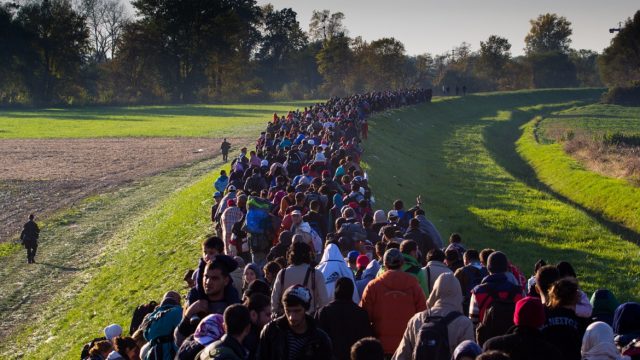
The number of people found to be illegally in the EU has increased by 22 percent in the latest statistics from Euro stat. At the same time very few illegal migrants who has been ordered to leave EU have done so – only about one of four.
Recently the European Commissioner for Home Affairs, Ylva Johansson, has raised the issue and criticized member states for not doing more to expel those who has their asylum application rejected.
She stressed, ahead of a meeting with interior ministers, that people who doesn’t have the right to stay should return to their own country.
This process can be significantly more effective and quicker, Johansson said and wanted to see a clear development in the work to increase the numbers of returns.
The migration authorities in the member states are overloaded with asylum applications. Many of these applicants are not in need for protection according to international laws and regulations. At the same time Euro Stat statistics shows that migration authorities requested 342,100 people to leave during 2021, the most recent year with full data available. Only 24 percent of them were returned to a country outside of the EU.
And beside the official channels the illegally immigration is increasing. According to Euro stat as many as 681,000 non-EU citizens were detected to be illegally present in the union. For 2021, there is an increase of 22 percent compared with the year before.
Catastrophically bad
When the Swedish MEP Charlie Weimers (ECR) is asked to comment on the news channel Riks he considers the development catastrophically bad for Europe.
– This contributes to a shadow society with increased segregation and crime. But it is good that these questions are on the table. We Sweden Democrats have long pointed out these problems, he stated.
In order for the development to be reversed, there must be political will. For example, Norway, a non-EU country, is twice as efficient in returning migrants as the EU country Sweden.
Norway not only uses voluntariness but also uses coercive means. They withdraw rights and make it more difficult for people who stay in the country illegally.
– It is excellent that the interior ministers in the EU now are discussing these low figures for return migration, Charlie Weimers said.
But he criticizes the Swedish presidency for talking about “irregular” immigrants instead of speaking clearly about “illegal” immigrants. It shows a lack of will to take the problem seriously.
There is also within the EU a strong resistance to acting forcefully, especially from the left side of politics.
– For example, the left-wing parties are strongly opposed to conditioning the payment of EU aid, so that the home countries take back their own citizens.
As the problems increase, and they will, MEP Charlie Weimers hopes that at least parties in the political center will better understand why increased return of immigrants is necessary.
Swedish presidency pushes for greater returns of migrants
At a EU-meeting with interior ministers in Stockholm, the Swedish migration minister Maria Malmer Stenergard underlined the importance of more measures being taken. EU member states must use the government’s power to make immigrants home countries willing to take their own citizens back.
It is really important that those who have been denied asylum in Europe returns to their homes, Maria Malmer Stenergard stated.
She was backed by the Swedish EU-commissioner Ylva Johansson at the meeting. Many applicants are not in require of international protection. To prove this, Johansson pointed out a number of rather safe countries such as India, Pakistan, Bangladesh, Morocco, Egypt, Tunisia and Cuba from which an increased flows of immigrants coming from.
Johansson also criticized the member states for not using the EU’s border control agency Frontex. Despite this agency is well-equipped to support the work with returning immigrants, only five member states are now use it.
She also rendered statistics that the member states governments reach out to countries of origin in only 16 percent of cases.
“We need to act as a team Europe”, she pleaded. Only then can EU put enough pressure on third countries and better organize return procedures.
She referred to the work that has been done in the a recent Commission draft plan.
Change in tone, but in action?
In recent years, the tone has hardened on migration. Especially since 2015-16 when EU took in millions of asylum-seekers. But in actual lawmaking not much has changed. The statistics used during the EU-meeting about returning immigrants show how bad everything works.
The reluctance within the EU to finance barriers at the Union’s external borders is a sign that not much is happening in practice, says Charlie Weimers.



 Subscribe
Subscribe